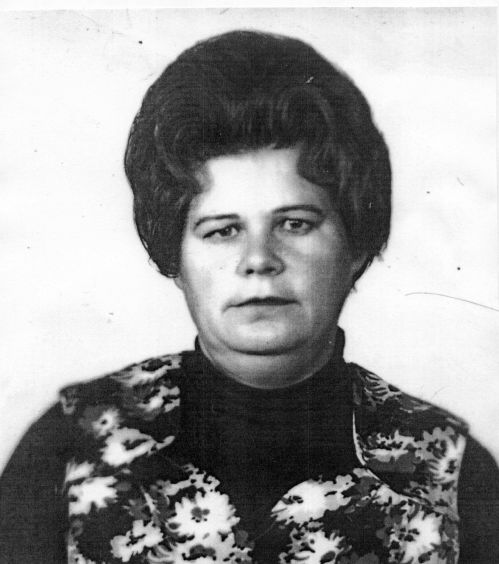A worker. Imprisoned for demanding justice.
From a family of kolkhozniks (collective farm workers). She completed seven years of schooling and a course to become a kindergarten director, and worked in a village kindergarten. From 1960, she worked at a brick factory in the city of Bila Tserkva, and from 1965, in a cafeteria trust as a worker, a buffet attendant, and a cashier. In 1976, she divorced her husband and lived with her neighbor, Olha Petrivna Ostroumova, whom she helped in every way. On March 5, 1977, her neighbor passed away without registering Hanna at the address, as she herself was not the legal owner of the house. Shevchuk gave her neighbor a proper burial, tended to her grave, and began petitioning the authorities for permission to purchase the house. The authorities refused her request, and six months later, they sold the house to another person. Shevchuk then lived intermittently in hotels and with acquaintances.
On August 19, 1977, Shevchuk appealed to the city court but was denied. She then began writing complaints against city executive committee officials Vasyl Zalevskyi, Viktor Besklinskyi, and Vasyl Blonskyi, accusing them of bribery, abuse of office, exceeding their authority, fraud, as well as anti-Soviet activities and terrorism. With the help of a lawyer, she appealed to the prosecutor's office and the KGB, wrote to the newspapers “Izvestia” and “Trud,” to the Committee for the Protection of Women, and three times to the Central Committee of the CPSU (in April 1978, and May and November 1979).
On March 4, 1979, the day of the elections to the Verkhovna Rada (Supreme Council) of the Ukrainian SSR, Shevchuk wrote on her ballot that she was refusing to vote as a sign of protest against the violation of her rights and the lawlessness in Bila Tserkva. On March 23, she sent a letter to the Ukrainian Helsinki Group, in which she detailed the history of the authorities' violations of her rights. She sought permission to emigrate. She was summoned to the KGB for “prophylactic talks.”
On November 16, 1979, she filed a lawsuit with the Bila Tserkva City Court, demanding that the aforementioned officials be brought to criminal justice. She was “publicly criticized” at meetings of her labor collective, ridiculed, and frequently visited by the district policeman.
The leaders of the executive committee filed a complaint against Shevchuk with the prosecutor's office, accusing her of making a deliberately false denunciation. On November 20, 1979, the Bila Tserkva Prosecutor's Office initiated criminal proceedings against Shevchuk, and on February 11, 1980, she was formally charged. Before that, by order of the prosecutor's office, she underwent a three-week psychiatric evaluation at the Pavlov Hospital in Kyiv. She was declared mentally sound and sane. She was under a written pledge not to leave the city.
On October 4, 1980, the Bila Tserkva City Court found Shevchuk guilty under Article 125, Part II of the Criminal Code of the Ukrainian SSR (“slander”), Article 126 (“insult”), and Article 177, Part II (“deliberately false reporting”) and sentenced her to 3 years of imprisonment in a standard-regime colony. The defendant did not plead guilty. On November 12, 1980, the criminal division of the Kyiv Oblast Court reviewed her lawyer's cassation appeal and upheld the verdict.
She served her sentence in Odesa. After 11 months, she was released under an amnesty. Back in Bila Tserkva, she was unable to find work for a long time, and she was denied a residence permit. Eventually, she was hired at the brick factory and given a place in a dormitory. However, no one wanted to share a room with her, saying, “We won't live with a zechka (female ex-convict).” She was then given a separate small room in the dormitory. In 1992, she received an apartment. Shevchuk is now retired and has a Group I disability rating.
After her release from prison, she did not engage in any human rights work.
Bibliography:
“V gruppu, sledyashchuyu za vypolneniyem Khelsinkskikh soglasheniy, ot Shevchuk Anny” [To the Group Monitoring the Implementation of the Helsinki Accords, from Anna Shevchuk]. // Personal archive of H.V. Shevchuk.
“USSR, Ministerstvo Yustitsii, Belotserkovskiy gorodskoy narodnyy sud Kiyevskoy oblasti, 19. 06. 1980 g. Obvinitelnoye zaklyucheniye Shevchuk Anne Vasilyevne” [Ukrainian SSR, Ministry of Justice, Bila Tserkva City People's Court of the Kyiv Oblast, June 19, 1980. Indictment of Anna Vasylivna Shevchuk]. // Personal archive of H.V. Shevchuk.
“Prigovor, 4 oktyabrya 1980 g., Belotserkovskiy narodnyy sud Kiyevskoy oblasti” [Verdict, October 4, 1980, Bila Tserkva People's Court of the Kyiv Oblast]. // Personal archive of H.V. Shevchuk.
Shevchuk, Hanna Vasylivna. // Autobiography.
Rukh oporu v Ukrayini: 1960–1990. Entsyklopedychnyi dovidnyk [The Resistance Movement in Ukraine: 1960–1990. An Encyclopedic Directory] / Foreword by Osyp Zinkevych, Oles Obertas. – Kyiv: Smoloskyp, 2010. – P. 722.

SHEVCHUK HANNA VASYLIVNA